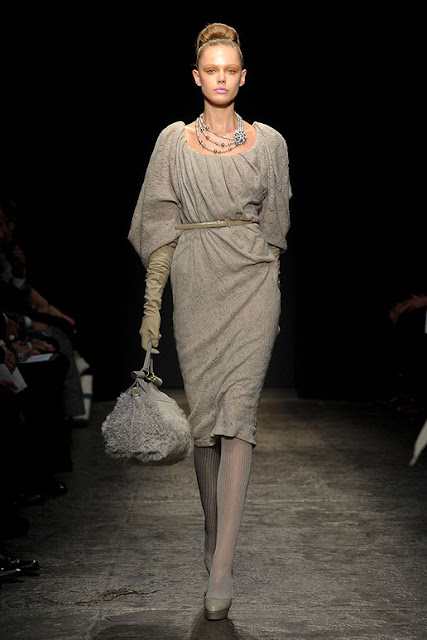
In a major shift for American fashion, Donna Karan,
the 66-year-old founder and chief designer of Donna Karan
International, a brand that defined the way American working women
dressed for decades, announced on Tuesday that she was leaving the helm
of the house that bears her name.
Ms.
Karan will remain as an adviser to Donna Karan International, but
devote more time to her Urban Zen line, which centers on wellness and
artisanal goods, and its foundation.
LVMH
Moët Hennessy Louis Vuitton, the French conglomerate that bought the
house in 2001, said there were no immediate plans to replace her as a
designer, and the main Donna Karan collection would be suspended. It will not hold a show at New York Fashion Week in September.
Instead,
according to an announcement, the company will reorganize its teams and
structure to “substantially increase its focus on the DKNY brand,” the
company’s more accessible line, which is currently responsible for 80
percent of Donna Karan International revenue. It will also maintain its
license business.
“It’s
a big corporate move and strategy statement,” said Robert Burke,
founder of a namesake luxury consultancy and former fashion director of
Bergdorf Goodman.
Ms.
Karan said in a statement, “LVMH and I have made this decision after
much soul-searching. I have arrived at a point in my life where I need
to spend more time to pursue my Urban Zen commitment to its fullest
potential and follow my vision of philanthropy and commerce.”
Interestingly, Ken Sunshine and the communications firm Sunshine Sachs were handling press requests for Ms. Karan on Tuesday.
Although
Mr. Sunshine represents a number of top-drawer entertainment clients,
including Ms. Karan’s close friend Barbra Streisand, he is largely known
for his work in crisis management and his aggressive representation of
people in acrimonious situations.

Over the past year, there have been signs that the relationship between Ms. Karan and LVMH had deteriorated.
Last
summer, Ms. Karan shuttered the three-story, 11,000-square-foot space
on Madison Avenue that for more than a decade had operated as her
signature line’s flagship store. This winter, the Neapolitan men’s wear
brand Isaia took over the lease.

In March, Ms. Karan gave an interview to WWD in which she seemed to acknowledge that all was not well with LVMH.
“I’m
married to my company,” Ms. Karan said. “I’ll be married to my company
whether I’m there or not there. I love the company, it’s my baby. Am I
still going to design there? I assume so.”
The
decision also reflects a reality of the New York fashion world, which
has seen an explosion in the contemporary market in recent years thanks
to brands such as Tory Burch, Alexander Wang and Rag & Bone.
In
April, LVMH acknowledged the importance of the sector by naming the hot
young designers Maxwell Osborne and Dao-Yi Chow of the haute streetwear
brand Public School the creative directors of DKNY, to much fanfare.
At
the time, Pierre-Yves Roussel, chairman of the LVMH Fashion Group, said
that LVMH “knows for a fact that most people who buy DKNY did not even
know it was by Donna Karan.”
The
retirement of Ms. Karan’s long-term right hand, Patti Cohen, in May led
to speculation that Ms. Karan might also soon step down. At a
presentation later that month, Ms. Karan told a reporter, “Never say
never.”
In an email, Ms. Streisand said that she was not worried about her friend.
“Donna
is so great at everything she does... designs, friendships,
compassionate causes... I’m sure her next steps will amaze us,” she
said.
Still, Ms. Streisand added, “I surely will miss her clothes.”
To
a generation of women, Ms. Karan, who started her company in 1984 with
“seven easy pieces,” a mix-and-match wardrobe, was a personal heroine: a
role model who understood their needs and solved their problems.
“Donna
created a way of dressing that was womanly, practical and empowering,
and came from a deeply personal, instinctual place; she has always let
her empathetic heart rule her design head,” said Anna Wintour, the
artistic director of Condé Nast and editor of Vogue magazine.
Along
with Calvin Klein and Ralph Lauren, Ms. Karan created one of the first
truly global brands at New York Fashion Week, an achievement that
brought her to the attention of LVMH, which paid $243 million to acquire
the brand.
It
also earned her a Lifetime Achievement Award from the Council of
Fashion Designers of America in 2004. She has also received the women’s
wear designer of the year award and the men’s wear designer of the year
award.
“She
came to the fore at a time when it was mainly men designing for women,
and she knew and understood her customers like no one else,” Mr. Burke
said.
In
the company’s statement, Caroline Brown, chief executive of Donna Karan
International, said of Ms. Karan, “I speak for the many teams at DKI in
supporting her great legacy and reinforcing our commitment to it for
our next chapter.”
No comments:
Post a Comment